Showcase Filmmaker Spotlight: Jasmine Lynea
Showcase Filmmaker Spotlight: Jasmine Lynea
By Travis Trew, Programming Associate
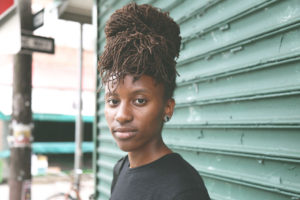
Having studied film and media arts at Temple University and worked on a variety of projects including documentaries, music videos, and shorts, New Jersey native Jasmine Lynea is passionate about using film as a tool to explore relevant social issues. Her film The Mixtape: Stay Black, Baby!, is a powerful and ambitious exploration of the various issues facing African American communities, from police brutality and transphobia to poverty and mass incarceration. With a free-form style that borrows as much from the language of music as that of cinema, the film is a showcase for various talented artists and performers to reflect on the state of Black America.
PFS: The film is almost a mixtape of genres, styles, and voices. How did you decide that you were going to approach the material through that unconventional format?
JL: It all started with the issues going on right now in terms of police violence on black bodies. The Freddie Gray incident had gotten me really frustrated, along with the other stuff that was going on. I didn’t know how to take it. And where I was living, back in Jersey, I was not aware of anything going on in my area, in terms or protest. I tried to find my peace of mind through music. I’d never listened to The Roots before, but I listened to their album Do You Want More?!!!??!, and after one of the songs I just started writing. I didn’t know what I was writing, but I just had this image of a black woman, and I saw her dancing because that’s her way of finding her peace amongst all that’s going on. Because I wanted to elaborate on so many different issues, and I was listening to this album, I thought why not make this a visual album so that I can elaborate on different topics. So that’s how the different “tracks” came about and how the different topics came into it. It was me trying to put everything on one screen. Because there’s so much to talk about. There’s so much that’s going on and I didn’t want to neglect certain issues that affected me.
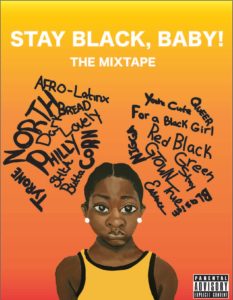 PFS: That’s something that’s really interesting about the film. It starts out with this very immediate, topical issue of police brutality—which obviously has been endemic for years but has been in the media a lot recently—but then it does go into these other issues, like trans violence, like suicide, like the legacy of slavery and incarceration. How did you come up with the outline of what you wanted to cover within a relatively short amount of time?
PFS: That’s something that’s really interesting about the film. It starts out with this very immediate, topical issue of police brutality—which obviously has been endemic for years but has been in the media a lot recently—but then it does go into these other issues, like trans violence, like suicide, like the legacy of slavery and incarceration. How did you come up with the outline of what you wanted to cover within a relatively short amount of time?
JL: My original intention was just to make that dance video, just the beginning part. But I kept writing because, again, it’s about all the things that affect me and all the things I’m learning about. I’m the kind of person who didn’t know transphobic violence was an epidemic. I wasn’t aware of that, but once I knew and educated myself on that, it was something I wanted to share with others. It just came to me. It’s just what my current state is.
PFS: Part of what makes the film so effective is how cinematic and visually adventurous it is. What were your cinematic influences?
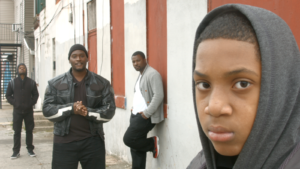 JL: Hip-hop music videos and Spike Lee. Especially the “Yo baby, Yo baby” scene. I wish I wrote it more as a rap because I wanted it to feel like they’re battling each other, because that’s what it’s like. They’re at war. But the influence comes from how music videos are stylized and how they flow: multiple shots, quick shots, and abrupt cuts. Because we had such a low budget we didn’t really get the music we wanted, but it’s still musically driven in terms of the style of the shots and everything. The film doesn’t have to have music on every track. I mentioned it’s influenced by hip-hop music videos. Take the music out of the hip-hop videos, and it still has that kind of feel and flow to it. Some of it—especially the tracking shot with the black man going through different settings and different outfits as he’s being dragged around by a pick-up truck—was influenced by Spike Lee. Those two things influenced the cinematic feel of the film.
JL: Hip-hop music videos and Spike Lee. Especially the “Yo baby, Yo baby” scene. I wish I wrote it more as a rap because I wanted it to feel like they’re battling each other, because that’s what it’s like. They’re at war. But the influence comes from how music videos are stylized and how they flow: multiple shots, quick shots, and abrupt cuts. Because we had such a low budget we didn’t really get the music we wanted, but it’s still musically driven in terms of the style of the shots and everything. The film doesn’t have to have music on every track. I mentioned it’s influenced by hip-hop music videos. Take the music out of the hip-hop videos, and it still has that kind of feel and flow to it. Some of it—especially the tracking shot with the black man going through different settings and different outfits as he’s being dragged around by a pick-up truck—was influenced by Spike Lee. Those two things influenced the cinematic feel of the film.
PFS: Another remarkable thing is the array of talented people performing or demonstrating their craft for the camera. Did you know most of the people in it already, or did you have to cast a net to find dancers, poets, musicians, etc.?
JL: The dancer from the opening scene, Shanel Edwards, I know from college. She just graduated from Temple University. She is a professional dancer, and she’s part of the dance company D2D: Dare to Dance. She’s also a photographer and a videographer. I’m actually currently editing a music video for her. She’s just an amazing person overall. She does a lot of things: she does hair and she is a great person when you need someone to talk to. But overall she’s a great dancer and that’s what she’s doing currently.
PFS: Did you give her the freedom to more or less choreograph that opening scene herself?
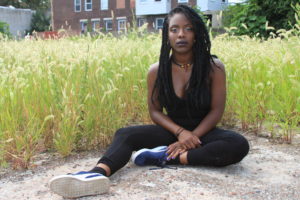
JL: Oh yes. And not just her. Also with Miriam Harris, the poet and teacher in “Miriam’s Post,” and Greg Corbin, who’s also a poet and teacher, in “Special Track by Greg Corbin.” With this film, I’m bringing some authenticity because it’s not just mine; these people have other projects of their own and were given the freedom to perform. Shanel is going through the types of things I’m going through and I told her, “I want you to really think about what’s going on around us, and how we’re affected by it. And I want you to try to find your peace through that.” And she performed that. I just allowed some of the people in the film to just be themselves because, again, this is reflecting off of reality.
PFS: Was that collective dynamic really important to the making of the film?
JL: We had no pre-production for The Mixtape. It was written out of frustration, as a way to find my peace in the midst of everything that was going on. It was just something that needed to happen for me. And I appreciate all the people who were involved because it was so unexpected, it evolved over time, and it did take us a while to finish it. Because we have four seasons, we didn’t have enough time to get all the shots in before the summer was over so we had to wait for the following year. We worked hard at it. Some of the shots of course I didn’t get, that goes for every filmmaker. But being this ambitious for a project, you will get it done. It may not be the one that you want, but we got it done and how people are receiving it is amazing. I really appreciate the people who watched it and reached out. It’s a beautiful thing. It was a very challenging experience but I’m glad we all went through it. The DP Saeed Briscoe, my co-producer David Ford, and the assistant director Alex Ma—we all stuck it through. We raised nothing for it. We kind of just did it. And all the people did it for free for us. So I just want to throw that out there. I think all film projects are made out of ambition, but with this film we really stuck to it.
PFS: What do you want people to come away from Stay Black, Baby! thinking?
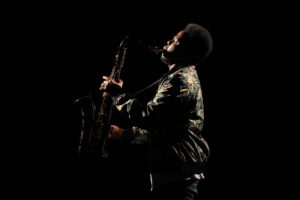 JL: I want them to be aware of the different issues that are going on. One of the major shots in the film is when I say “All black lives matter,” because people really think when we just mention “black lives matter,” that it’s about the attack on black bodies from the police force. It’s really more to that. The violence against trans people, suicide, and how education is lacking in black communities are also detrimental. They’re also killing our kids. I really want people to take away these different issues and understand that they go on and there’s more than one thing. I just want people to take away the different issues that are going on here, because it’s not one thing. And I know that they can’t be fixed all at once, but it’s good to be aware of the different things that go on. If we work as one, we’ve already won.
JL: I want them to be aware of the different issues that are going on. One of the major shots in the film is when I say “All black lives matter,” because people really think when we just mention “black lives matter,” that it’s about the attack on black bodies from the police force. It’s really more to that. The violence against trans people, suicide, and how education is lacking in black communities are also detrimental. They’re also killing our kids. I really want people to take away these different issues and understand that they go on and there’s more than one thing. I just want people to take away the different issues that are going on here, because it’s not one thing. And I know that they can’t be fixed all at once, but it’s good to be aware of the different things that go on. If we work as one, we’ve already won.
PFS: Are you working on anything currently?
JL: We are. David Ford and I just created a YouTube channel. We want to give artists a platform to perform and show off their talents. It’s called XLR. We have two series going on: The Audition Tape, which features singers, rappers, and actors. It’s just really simple and authentic, where we have the artist in front of a black backdrop. It gives the artists a platform to be themselves in front of the camera while showing their talents. And that’s why it’s called The Audition Tape, because they’re auditioning for the world. We have another series called the West Toronto series. It’s shot at the same spot where Shanel performs in the opening scene of Stay Black, Baby!, because that spot looks just like a stage. Our artists, musicians, and singers perform there in a live performance, which we’re capturing like a music video. I have another series in mind that’s going to elaborate on other social and political issues, in terms of the black community, but in narrative form.
https://vimeo.com/190611187
The Mixtape: Stay Black, Baby! will screen on Thursday, August 10th at the Prince Theater’s Black Box as part of Philly Film Showcase, an exhibition supporting new work by talented, up-and-coming local filmmakers.